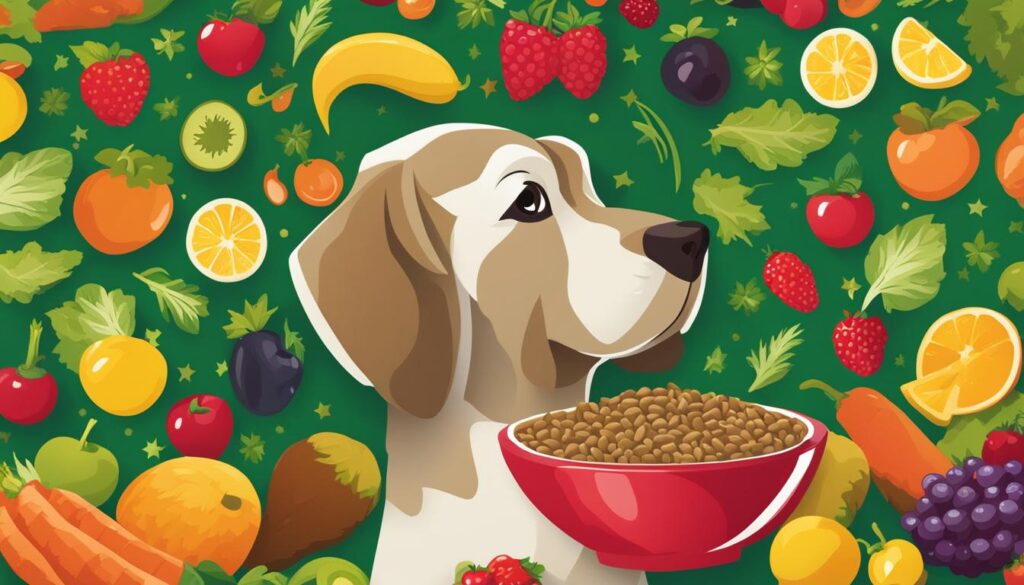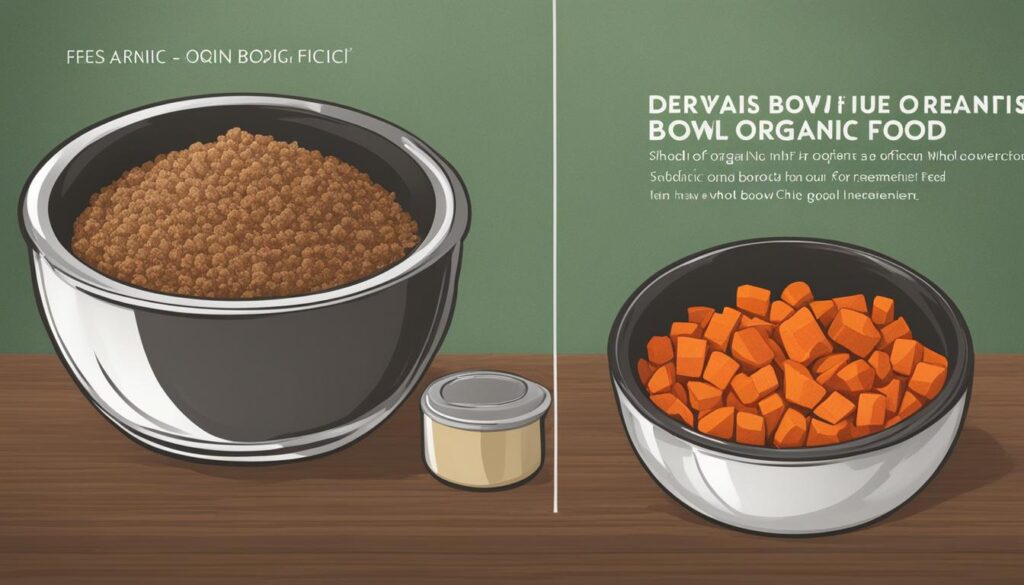If you’re a dog owner, you’ve probably found yourself standing in front of a daunting selection of dog food options. Among the many choices, you may have come across organic and non-organic dog food. But what’s the difference, and which one is better for your furry best friend?
Organic dog food is made from natural ingredients and is often free from harmful pesticides, preservatives, and artificial additives. On the other hand, non-organic dog food may contain fillers, artificial ingredients, and potentially harmful chemicals. While non-organic food may be cheaper, the potential long-term health risks may outweigh the immediate cost benefits.
In this article, we’ll take a closer look at the benefits of choosing organic dog food and the potential drawbacks of non-organic options. By the end of this read, you’ll have a better understanding of what type of food is best for your pooch.
Understanding Organic Dog Food
Organic dog food is becoming an increasingly popular option for pet owners who want to ensure their furry friends get the best nutrition possible. But what sets organic dog food apart from other types of dog food?
At its core, organic dog food is made from natural ingredients, free from artificial additives, preservatives, and other harmful chemicals. Because it is made from whole, natural foods, organic dog food is seen as a healthier alternative to other types of dog food.
What Makes Organic Dog Food Different?
The main difference between organic and non-organic dog food lies in the ingredients that are used. While non-organic dog food may contain fillers, preservatives, and synthetic additives, organic dog food is made using whole foods without any artificial ingredients.
Organic dog food also tends to be free from antibiotics and hormones, which are commonly used in non-organic farming practices. By choosing organic dog food, you can avoid exposing your furry friend to these potentially harmful substances.
The Benefits of Organic Dog Food
One of the biggest benefits of organic dog food is that it’s a natural, healthy option for your pet. Because it’s made using whole, natural ingredients, it’s packed with nutrients that can help support your pet’s immune system, promote healthy digestion, and even aid in weight management.
Organic dog food can also be a great choice if your pet suffers from food allergies or sensitivities. Many organic dog food brands offer hypoallergenic options that are free from common allergens like corn, wheat, and soy.
Choosing the Best Organic Dog Food
When it comes to choosing the best organic dog food for your pet, there are many factors to consider. Look for a brand that uses high-quality, natural ingredients. You’ll also want to consider your dog’s specific dietary needs, such as breed, age, and overall health.
There are many great organic dog food brands available on the market, and it’s important to do your research to find the right option for your pet. Look for organic dog food reviews from other pet owners to get an idea of which brands are the most popular and effective.
The best organic dog food is one that is made with natural ingredients, free of synthetic additives, and tailored to meet your pet’s unique needs.


Benefits of Choosing Organic Dog Food
If you’re looking to provide your furry friend with the best possible nutrition, organic dog food is a great choice. Organic dog food is made with natural, high-quality ingredients that offer many benefits for your pet.
One of the main benefits of organic dog food is its higher nutritional content. Organic dog food is made with whole ingredients, like fresh meats and vegetables, that offer a complete nutritional profile. This means that your dog is getting all of the essential vitamins and minerals they need to stay healthy and happy.
Another advantage of organic dog food is that it doesn’t contain any harmful additives or preservatives. Non-organic options often have artificial flavors, colors, and preservatives that can be detrimental to your dog’s health in the long run.
Organic dog food is also great for managing allergies and improving digestion. The natural ingredients and lack of additives make it easier for your dog’s digestive system to process the food, reducing the risk of upset stomachs, diarrhea, or vomiting. Additionally, organic dog food doesn’t contain common allergens like wheat, soy, or corn, making it an excellent option for dogs with food sensitivities or intolerances.
Best Organic Dog Food Brands
If you’re considering switching your dog to organic food, there are many excellent options on the market. Here are a few of the best organic dog food brands:
| Brand | Features | Price |
|---|---|---|
| Organix | – Made with organic, free-range chicken – No added growth hormones – Grain-free options available |
$45 for 14 lb bag |
| Nature’s Variety | – Made with high-quality protein- Grain-free options available – Variety of flavors |
$40 for 13.5 lb bag |
| Halo | – Made with whole meats and vegetables – No artificial additives or preservatives – Sustainably sourced ingredients |
$45 for 14 lb bag |
Ultimately, the best organic dog food will depend on your dog’s specific needs and preferences. Consider factors like age, breed, and unique health concerns when selecting a brand and variety.


Drawbacks of Non-Organic Dog Food
Choosing non-organic dog food may come with some potential disadvantages. Unlike organic dog food which is made with natural ingredients, non-organic options can contain artificial components, fillers, and preservatives.
These additives may provide a cheaper alternative to natural ingredients, but over time, can affect your dog’s health. Some of the disadvantages of non-organic dog food include:
| Disadvantages | Description |
|---|---|
| Lower in Nutritional Content |
Compared to organic dog food, non-organic dog food may have lower nutritional content. It may not provide the necessary vitamins and minerals needed for your dog’s overall health and wellbeing. |
| Artificial Additives |
Many non-organic dog foods contain artificial additives such as colors, flavors, and preservatives. These can be harmful to your dog’s health, leading to allergies, digestive problems, and even cancer. |
| Fillers |
Non-organic dog food often includes fillers such as corn and wheat which can be difficult for your dog to digest. They may also lead to weight gain and other health issues such as diabetes and heart disease |
When selecting non-organic dog food, it’s important to read the labels carefully and understand the ingredients used. It might be best to consult with your veterinarian before making a decision, especially if your dog has specific health requirements or medical conditions.
Choosing organic dog food can have numerous benefits for your furry friend. In the next section, we’ll explore these benefits in more detail.
Making the Right Choice for Your Pooch
Choosing the right type of food for your dog can be overwhelming, but it’s essential for their health and wellbeing. When deciding between organic and non-organic dog food, consider factors such as your pet’s age, breed, and specific dietary needs.
If your dog has any existing health conditions or allergies, it’s best to consult with your veterinarian to determine the best food options.
Reading Labels
Reading labels is essential to ensure you’re making an informed decision about your pet’s food. Look for natural, whole food ingredients and avoid artificial flavors, colors, and preservatives.
If you’re unsure what ingredients to avoid, check out this list for reference.
The Best Organic Dog Food
When it comes to selecting the best organic dog food, your choices are plentiful. Some top organic brands include Organix, Newman’s Own Organics, and Blue Buffalo.
Consider factors such as availability, price, and ingredient quality when making your decision. A review of the best organic dog food can also be helpful in guiding your choice.
Incorporating Natural Foods
In addition to organic dog food, consider incorporating natural foods into your pet’s diet. These can include fresh fruits and vegetables that are safe for dogs, such as carrots and apples.
You can also add organic supplements to their food, such as fish or flaxseed oil, for added health benefits. Just be sure to check with your vet before making any changes to your pet’s diet.


With the abundance of choices available, selecting the best food for your dog can be overwhelming. But by taking the time to understand your pet’s needs and reading labels carefully, you can make an informed decision. And by choosing an organic or natural diet, you can promote your dog’s overall health and wellbeing.
Incorporating Organic Dog Food into Your Pooch’s Diet
So, you’ve decided to make the switch to organic dog food – great choice! Now, it’s time to start gradually incorporating it into your furry friend’s diet. This process should be done slowly over the course of a week or two to ensure a smooth transition and avoid digestive problems.
Begin by mixing a small amount of organic dog food into your dog’s current food, gradually increasing the amount each day. Keep an eye on your dog’s stool to make sure they are adjusting well to the new food. You may also consider supplementing your dog’s diet with natural supplements such as Omega-3s or probiotics to ensure a well-rounded diet.
| Tip: | Consult with your vet before making any major changes to your pet’s diet to ensure it’s the best choice for their individual needs. |
|---|
It’s important to remember that every dog is different, and what works for one may not work for another. Monitor your dog’s behavior and health to determine if the organic dog food is the right decision for them.
Incorporating organic dog food into your dog’s diet can have numerous benefits, including improved nutrition, digestion, and overall health. By taking the time to make the transition slowly and carefully, you can help set your furry friend up for a lifetime of optimal health and wellness.


Conclusion
Choosing the right type of dog food is essential for your pet’s health and wellbeing. In this article, we’ve explored the differences between organic and non-organic dog food, the benefits of choosing organic, as well as the drawbacks of non-organic options. Ultimately, the decision between organic and non-organic dog food depends on your dog’s individual needs and your personal preferences.
While organic dog food offers numerous benefits, such as higher nutrition content, absence of harmful additives and preservatives, and potential improvements in digestion and allergy management, it may not always be the best choice for your pooch. On the other hand, non-organic dog food may contain fillers, artificial ingredients, and potential health risks associated with long-term consumption.
It’s important to consider factors such as your dog’s age, breed, and specific dietary needs when choosing between organic and non-organic options. Additionally, you can read labels and understand the ingredients to ensure you’re making an informed decision for your furry friend.
By following the tips provided in this article, you can make the right choice for your pooch and incorporate organic dog food into your pet’s diet. Remember that a well-rounded, organic diet can promote your dog’s overall health and happiness.
Thank you for reading this article on organic vs. non-organic dog food, and we hope you found it informative in making the best decision for your furry friend.
FAQ
What is the difference between organic and non-organic dog food?
Organic dog food is made from natural ingredients that are free from synthetic chemicals, pesticides, and preservatives. Non-organic dog food may contain fillers, artificial ingredients, and additives that are not as beneficial for your pet’s health.
What are the benefits of choosing organic dog food?
Organic dog food offers several advantages. It provides higher nutritional content, promotes better digestion, minimizes the risk of allergies, and supports overall health and wellbeing for your furry friend.
What are the disadvantages of non-organic dog food?
Non-organic dog food often contains fillers, artificial ingredients, and potentially harmful additives. Over time, these ingredients can lead to health issues in dogs, such as obesity, digestive problems, and allergies.
How do I choose the best organic dog food?
When selecting organic dog food, consider factors such as your dog’s age, breed, and specific dietary needs. Read labels carefully, look for natural ingredients, and consider brands with positive organic dog food reviews.
How can I incorporate organic dog food into my pet’s diet?
To introduce organic dog food, transition gradually by mixing it with your dog’s current food. Increase the proportion of organic food over time to allow for a smooth transition. You can also complement their diet with natural supplements to ensure nutritional balance.

